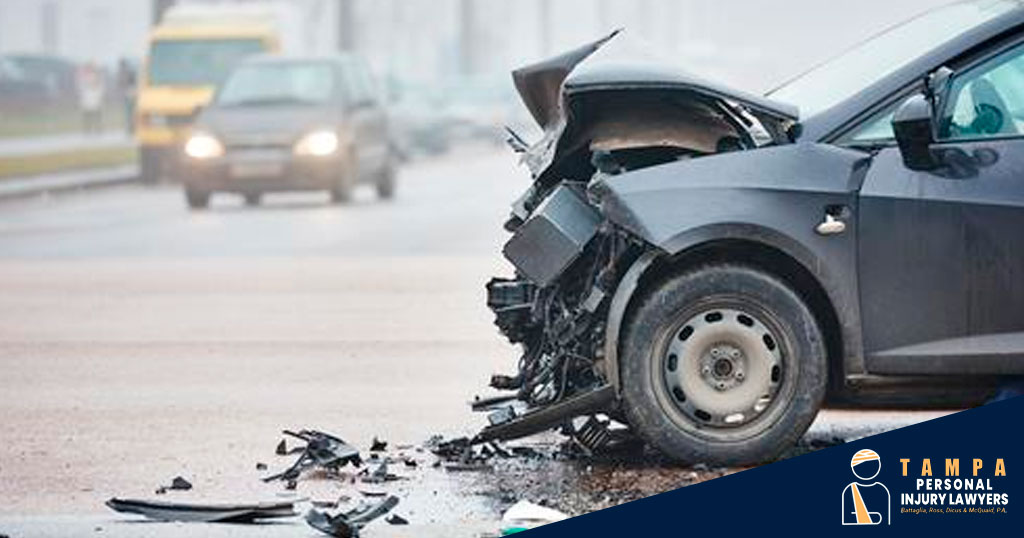Negligence – it’s a word you may see come up all the time if you’ve ever been in a car accident or other type of personal injury claim. But did you know there are different types of negligence? In this article, we’ll discuss gross negligence and how it differs from ordinary negligence.
If you were injured by a negligent driver, you have legal recourse and may be entitled to seek monetary compensation. Moreover, if the at-fault party is found to be “grossly negligent” you may be entitled to even more money. Our legal team has helped countless Tampa car accident victims win millions in financial compensation. That’s why we’ve written this blog; to help victims understand their rights and how gross negligence could affect their claim.
To learn about what is considered gross negligence in Tampa and how a Tampa Car Accident Lawyer can help you, continue reading.
Table of Contents
ToggleWhat is Ordinary Negligence?
Ordinary negligence is the failure to exercise reasonable and prudent care in a given situation. The level of care or caution is standard that any normal person would have used in that same situation. In other words, ordinary negligence is when a person makes a careless mistake or acts in a reckless manner and causes an injury to someone else that otherwise could have been prevented. They failed to take reasonable precautions that the average person would have taken under the same circumstances.
Consider these vignettes to illustrate examples of ordinary negligence:
- Mary decides to step on the gas rather than slamming the brakes when she sees the light turn yellow. She ends up T-boning a car that’s making a turn at the intersection and severely injuring the driver. Mary’s driving was negligent in this scenario.
- Jane is texting while she’s dropping her kids off at school and rear-ends the car in front of her. In this instance, Jane is practicing distracted driving behavior and her negligence caused a collision that caused the driver to sustain severe whiplash and a herniated disc.
- Rick is eager to get to a party and drives 70 mph on a 55 mph interstate. While hastily passing cars, he causes a head-on collision and the other driver sustains facial fractures and broken ribs.
- James was preoccupied about all the coursework he needed to catch up on after missing several weeks of school due to an injury while playing baseball. While he is distracted by his thoughts, he ends up hitting a pedestrian who sustains severe injuries.
While all of the above drivers did not intentionally cause any harm, their inattention or carelessness ultimately inflicted suffering on an innocent victim. These are all examples that illustrate a basic negligence case. Although Mary, Jane, Rick, nor James wanted or intended to cause harm to another person, they did. Therefore, they can be liable for damages. Being liable means they are legally responsible for covering the damages they caused to the injury victim.
The injury victim could recover compensation for their injuries through a civil lawsuit (i.e., a Tampa personal injury claim), which would help them recover money to pay for:
- Medical expenses
- Property damage
- Lost income
- Pain and suffering
- Mental anguish
- Any other accident related losses
Proving Negligence in a Tampa Car Accident
The most important part of any personal injury claims it proves negligence. If you believe the at fault party is guilty of ordinary negligence, there are four key elements to prove.
The first thing you need to prove is that the negligent driver had a legal duty to exercise caution in the given situation. When it comes to car accidents, this is inherent in the fact that all roadways users and motorists have a civic responsibility to drive cautiously and prudent to avoid causing harm to others. In short, all drivers are expected to drive safely and not harm others.
The second component of proving negligence is demonstrating that the at-fault person breach their legal duty to practice reasonable care. They may have done so by performing certain actions or failing to perform certain actions (e.g., following too closely or failing to check their blind spot before switching lanes).
Then, you need to prove causation, which basically means that you need to make it clear that their negligence directly caused your injuries.
Finally, proving negligence requires showing the damages you suffer and verifying that the negligent person’s actions harmed you. Once you prove duty, a breach of duty, causation, and damages, you have the basic groundwork for building a sound personal injury case. Now you can start discussing damages and the value of your claim with your Tampa Car Accident Lawyer.
What is Gross Negligence?
Tampa law makes a distinction between ordinary negligence and gross negligence in
Florida Statutes Chapter 768 Section 72.
Gross negligence is defined as when a person engages in conduct with reckless and conscious disregard to the rights, safety, or life of another individual. Basically, gross negligence is negligence that is extremely reckless, beyond mere carelessness.
In many cases, gross negligence involves a key distinguishing factor that differentiates it from ordinary negligence: intention. In cases of gross negligence, the defendant is indifferent to the possibility of violating another person’s rights or endangering their well-being and safety. Gross negligence is much more than just a human error or an honest mistake – it’s heedless delinquency.
There is a fine line between ordinary and gross negligence, it all boils down to the degree of carelessness. Both are negligence with different levels of carelessness but neither are synonymous to “willful and wanton conduct”. Willful and wanton conduct is the most extreme form of negligence, when the defendant takes a risk, knowing there is a high probability of causing harm to another.
It’s vital to understand the difference between ordinary negligence, gross negligence, and willful and wanton conduct. That’s because the outcome of a personal injury claim can be drastically different depending on what type of negligence or fault the defendant is found to have.
For instance, if a defendant is found to have been grossly negligent, they can use contributory negligence as a defense against the plaintiff to reduce their percentage of fault. However, in the case of willful and wanton conduct, the defendant may not use the contributory negligence defense.
Finally, when considering the differential outcomes between the case of negligence and wanton misconduct, punitive damages are a factor. While a plaintiff can be eligible to recover punitive damages from a defendant who is guilty of willful and wanton misconduct, the same does not hold true for a plaintiff seeking damages from a grossly negligent defendant.
The Key Elements of Gross Negligence in Tampa Car Accident Cases
The elements of gross negligence are the same as negligence. So, just as proving ordinary negligence requires the plaintiff to prove duty of care, breach of duty, causation, and damages, the same holds true for proving gross negligence.
However, negligence can be tantamount to gross negligence if the plaintiff can also prove these additional conditions were present:
- The negligent person was aware of the potential harm or damage they might cause another through their actions
- They were intentionally negligent and intended to cause harm to the plaintiff
Examples Of Gross Negligence
The difference between ordinary negligence and gross negligence is not always easy to distinguish. In fact, the difference can be a fine line that requires the expertise of an experienced attorney who can assess your case details and reasonably conclude that the at fault party was grossly negligent.
Consider the following examples to get a better understanding of the difference between gross negligence (compared to the above examples of ordinary negligence):
- Hillary was driving 100 mph in a 55mph zone and hit and killed a pedestrian. Hillary was grossly negligent.
- Bill knew that his car needed extensive repairs yet still drove it before having the necessary maintenance and reparations done. As a result, his brakes gave out and he caused a multi-car pileup accident. Since Joe was aware that his vehicle needed serious repairs, he could be guilty of gross negligence.
- Joe had nine vodka sodas within a 3-hour time frame at his favorite bar before getting in his car to drive home. He caused a collision with another car that killed the driver and all three passengers in the car. Joe is guilty of gross negligence. In this particular instance, the establishment and the employee could also be liable for serving Joe an excessive amount of alcohol within the given time period and letting him drive home afterwards.
Punitive Damages and Gross Negligence in Tampa Car Accidents
Ordinary negligence generally warrants compensatory damages from the defendant, paid to the plaintiff. But when the defendant is guilty of gross negligence, the injury victim may be able to seek punitive damages in addition to compensatory damages.
Compensatory damages are exactly what they sound like – they are intended to compensate the injury victim for all accident related losses. On the other hand, punitive damages are only appropriate when the defendant was grossly negligent. Punitive damages have two functions: to penalize the negligent party and prevent them from committing the same offense in the future.
Punitive Damages Cap in Tampa, Florida
First of all, punitive damages are rarely awarded in Florida courts. That said, when they are awarded to the plaintiff, they can’t exceed the legal limit (or cap) adjudicated by Tampa’s legal doctrines. Under Florida Statute 768.73, the punitive damage cap is $500,000, unless there are extenuating circumstances, or triple the amount of compensatory damages.
So if you win $350,000 in compensatory damages, you could potentially receive a maximum of $1,050,000 in punitive damage awards. You will need an experienced attorney to assess your case to help you get a realistic idea of whether or not you are eligible to seek punitive damages.
If You Are an Injury Victim of Gross Negligence, You Need to Hire a Tampa Personal Injury Lawyer
If you are stuck with an injury that has impacted you, your family, and your entire life all because of a grossly negligent driver, you need to get legal help.
Our Tampa car accident lawyers will fight aggressively to win you the full amount possible for everything you’ve been through. We believe in serving justice to innocent victims of negligence and holding people accountable for their reckless behavior.
Call us today to discuss your case. We offer a free initial consultation so you have nothing to lose by reaching out now.






























